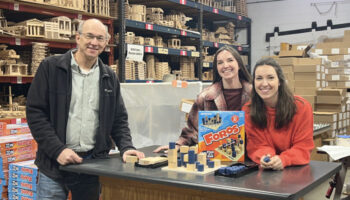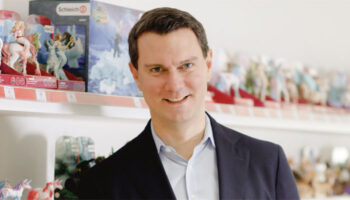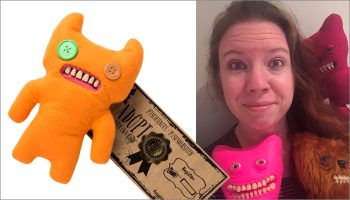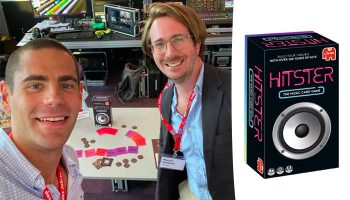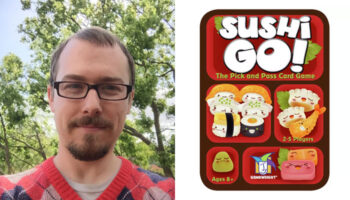Radio 1’s Matt Edmondson on how lockdown boredom led him to launch his own board game company, Format Games
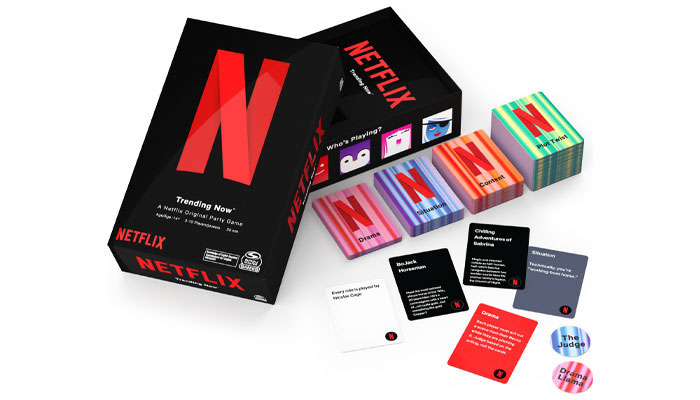
Earlier this year, television and Sony award-nominated radio presenter Matt Edmondson launched a new board game company called Format Games.
Matt first entered the game space as the inventor of Big Potato’s Obama Llama, and last year he self-published Ansagrams.
Now Matt and his brother-in-law Laurence Emmett have founded Format Games and are launching two new games this year in the form of colour-mixing card game Egg Slam and trivia title, So Wrong It’s Right.
We caught up with Matt to find out how a career creating formats for TV and radio proved the prefect prep for a pivot into party games.

Matt, great to catch up. Before we dive into all things Format Games, how did you get into game design? Were you into games from a young age?
Not really if I’m honest! We did play a lot of board games and card games because we went on a family camping holiday every year, so we would often take games there. Every Christmas we’d get a new board game, often one that was tied into a movie or TV show. My sister got a Garfield board game and it was quite disappointing, and I got a Home Alone 2 board game, which I was very excited about because it needed batteries… But the gameplay was extremely complicated!
When I was in my twenties, I played more games. I was sent Bananagrams – which I loved – and I would often play card games with my housemates, but I’d never thought about creating my own game.
So what changed? Was there a moment that set you on the path to game design?
Because of my job on Radio 1, I spend a lot of time creating features and games for the show, many of which are the sorts of mechanics you’d expect to find in board games. Another part of my life is trying to come up with TV quiz shows, and these jobs all boil down to creating killer formats that are easy to understand and fun to play.
It wasn’t until the idea for Obama Llama popped into my head – and I had tried to pitch it as a TV show initially, but it didn’t get picked up – so I thought ‘this is too good an idea to not do anything with!’ That’s when I decided to experiment with turning it into a board game… And then, like a lot of things in life, once you’ve done something once, you realise you can probably do it again.
You licensed Obama Llama to Big Potato. Did that process act as a bit of a crash course into the games industry?
I initially took the idea to Lesley Singleton from Playtime PR. She was the only person I knew from the board game industry because she had sent me Bananagrams. She probably had that feeling of dread when she met me of ‘Oh no, another person who thinks they have a great idea for a board game!’
So I took her Obama Llama and she thought it was quite good. She told me I had two routes – I could self-publish or I could find someone to license it to. Self-publishing sounded hard, so I went down the licensing route and I was really lucky to meet Big Potato because they are the dons at doing party games. They made it into the hit that it is.

Great stuff. Now you said there that self-publishing sounded hard, but fast-forward to today and you’ve launched your own games company in Format Games. What changed your mind?
It happened organically and accidentally, as do lots of things in my life.
I come up with games a lot, and I usually don’t do anything with them. When the pandemic hit, loads of my time got freed up. I was going to be making a TV show, that didn’t happen. I was doing radio but from home, so I had loads of extra time. I get bored very easily, so I set myself a couple of projects. One was to make an album, because why not?! It was a fun thing to experiment with. The other thing that kept me sane was one was to try and get one of my board game ideas made.
My brother-in-law Laurence hasn’t got a creative bone in his body, but he’s fantastic at logistics. He was also going through a bit of a tough time with his cleaning business. It shut down because he couldn’t send cleaners to people’s homes during the pandemic. He had nothing to do and I had nothing to do, and our skill-sets matched up.
He said: “If you design it, I’ll find a way of getting it made and out there.” It was a fun experiment for us, so we made a game called Ansagrams which had been in my head for a while. It’s a very simple trivia game where you get five questions and you have to write down the first letter of each answer. Then, like a Countdown Conundrum, you have to unjumble them to create another word. First person to do that wins the card.
 So you had the idea; what next?
So you had the idea; what next?
I bashed out the questions in a couple of days, but if a graphic designer watched me try and design it, they would’ve found it hilarious. I didn’t know what I was doing, but I’ve always been keen to learn, so using YouTube and TikTok I figured out how to make it.
We got 3,000 of them made, and I assumed we’d be selling them over a three-year period in dribs and drabs. Amazon wouldn’t let us sell them in batches greater than 50, so we set up an Etsy store where Laurence had to do all the fulfilment himself out of his kitchen!
Poor Laurence! How long did it take to sell through the 3,000 copies?
We sold out in about a week and a half. Then, the real push to do more games came when we met with John Lewis following the success of Ansagrams. They said the most dangerous thing that could be said to me: “If you have any other ideas, let us know.”
Ha! And did you have other ideas?
Yes, I’d been working on a game with my daughter called Egg Slam. Then I had the idea for another game called So Wrong, It’s Right. We mocked them up really quickly, pitched them in, and they wanted them exclusively on the high street for this Christmas.
They told us we needed a distributor, so they introduced us to Asmodee. We really liked them, they said they could distribute the games in the UK for us and then we asked if we could also speak to their US office.
We did a Dragons’ Den-style Zoom pitch to the Asmodee guys in the States and we were offered a global distribution deal that covers the US, Canada, Australia, New Zealand and South Africa. They wanted the games I’ve mentioned, plus our newest one, Noggin. We can’t think of a better partner for global distribution than Asmodee.
It’s a crazy story and it snowballed at a pace we weren’t expecting.

Fantastic, congrats on that. I should’ve asked this at the start but why the name Format Games?
Well, I love formats. Most of things I do creatively in my life are based around formats. I don’t think I’m particular good at free-form stuff, but if someone says “We’ve got a problem with a quiz show, how do we fix it?”, my brain can figure that stuff out.
There’s also a bit of a joke in there. My name is Matt, and these games are ‘for Matt’.
Very good. I had missed that! Do you think a career creating radio formats that quick to grasp and fun to play primed you perfectly to create party games?
I think so – and those are the sorts of games I like.
I’ve played strategy games that have clever mathematics underpinning them, and I could never come up with one of those. They are genius! What I can do is identify a feeling that’s fun and find a way to give you lots of that feeling in a game.
It often starts with simple ideas that you then build structure around. Look at Obama Llama; it’s two things rhyming… Britney Spears using garden shears. On its own, that’s not a game, so that’s why you have to build a world around that concept. That’s what I’m drawn to: super accessible, mainstream party games.
Let’s look at Format Games’ debut line-up. Ansagrams and So Wrong, It’s Right are both fun twists on trivia games. Did you consciously set out to bring something new to the trivia space?
I would never sit down and say “I’m going to do a trivia game, what’s the twist?” The twist always comes first.
With Ansagrams, it popped into my head fully formed. I just had the idea of ‘Anagrams are fun. You could solve those by taking the first letter of every answer.’ That’s as far as the thought went!
With So Wrong, It’s Right, we did a quiz on the radio ages ago called The Wrong Way Round Quiz. It was based on spoonerisng words – so swapping the first letters of answers around. My co-host is called Mollie King, so if she was the answer to a question you’d have to say Kollie Ming.
Funny!
Right! It did a funny thing to my head where I would know the answer, but I just couldn’t get there! It’s funny and I thought I should do that as a board game, but a spoonerism on its own isn’t enough.
It has to be a two-word answer to be a spoonerism, so I thought what if the words swapped around. So then I had two things! Then I thought you could just give the correct answer normally – so now I had three elements.
Then I thought, rather than switch the letters, what about if you had to ditch the letters? That was the fourth thing sorted. Then I thought, maybe there’s one element where you have to deliberately give the wrong answer. Now I have a quiz – and it’s a quiz where you could answer one question in five different ways.
I felt like I was collecting Infinity Stones!
 Ha! It’s smart – and I suppose it also means you don’t have to necessarily be a trivia whizz to be good at it.
Ha! It’s smart – and I suppose it also means you don’t have to necessarily be a trivia whizz to be good at it.
Exactly. I always feel self-conscious playing trivia games because I’m rubbish at general knowledge. I did Richard Osman’s House of Games and when anything came up requiring actual general knowledge, I was bricking it!
Ansagrams and So Wrong, It’s Right are both unthreatening trivia games. The questions are quite easy, but you have to do something special with the answers. That’s the magic of these trivia games.
We have a game coming out next year called Noggin – which I genuinely think is the best game I’ve ever played, not just invented! – and it has that same kind of thing going on.
That’s a bold statement Matt.
Genuinely, brace yourselves! It is the single best game I have ever played ever. It’s so good. If it doesn’t become the biggest game in the world, there will have been an injustice. I could play it every day and never get bored of it.
Well now I’m going to be counting down the days to its unveiling! I also wanted to ask; you’re a TV presenter, you’re a Radio 1 DJ… Do you think being famous has made it easier to successfully launch your own games?
I think it does make it easier. I have an audience of people that can hear about the game early on. I have 100,000 Instagram followers and I can tell them about the game. If you’re launching a game, you want to be able to tell people it exists, so I have that advantage.
Also, through people knowing my personality because of the radio or having played my previous games, they trust that I like board games and I know what I’m doing. In that respect it’s easier.
That said, all of that only goes so far. If the games were bad, that would not last long. People reviewing it on Amazon don’t know I’m involved; my name isn’t on the box. The people that Asmodee are selling it into don’t know it’s connected to me. There’s not a cardboard cut-out of me in stores with a bubble that says, ‘I invented these games!’
After the initial announcement that we’re behind these games, they’ll live or die based on whether they’re good. That won’t be truer than when they land in other countries. I have zero clout in America, for example, so the Asmodee US team just cared about whether the games were good.
How do you fuel your creativity, or is that tap always turned on?
The tap definitely isn’t always turned on. I go through real waves of inspiration and whatever the opposite of inspiration is. It’s hard to know where ideas come from, but my ideas usually arrive fairly fully formed and with a sense of urgency that’s hard to describe.
I have a thing called cyclothymia. It’s like a watered down bipolar. It means I have waves of incredible productivity followed by a lowness where I feel like I’m never going to have another idea again. In those waves of productivity, I feel very alive with creative energy and feel inspired by things I see and hear. At some point, you feel like ‘BAM – I’ve got it!’ and at that point, I feel like I need to purge myself of the idea. In that space, I feel I’m able to accomplish things that ‘everyday me’ couldn’t.
That occassionally comes with its own problems sometimes because I’ve got other things to be getting on with, but over the years I’ve learnt to recognise and pause that feeling, before coming back to it whenever works best.
Matt, thanks for taking time out for this – it’s been a lot of fun. To bring things full circle – you mentioned at the start about having a bad time with a Home Alone 2 board game. Are licensed games something you want to explore with Format Games?
The idea that someone would say ‘we have this movie, turn it into a game’, I’d love that! I’d find that joyful. That said, the big question with a licensed game is: Is the game going to be any good? I don’t want people to have the experience I had with the Home Alone 2 game.
The ones that do it really well are the games that have a fantastic mechanic at the heart of them, like Dobble. It means the licensed versions of Dobble, like Dobble Gruffalo, give you the best of both worlds; you get a fantastic game mechanic while introducing people to Julia Donaldson, or you’re introducing Gruffalo fans to a new fantastic game like Dobble. It’s a good partnership.

Mean Girls from Big Potato is another great example of that. They’ve taken Truth Bombs – a great game with a brilliant mechanic – and they’ve put a different skin on it, but at its core is really strong game.
I’ve got a few game ideas that will be coming in the next couple of years that are in that family space that will lend themselves to licensing in a really big way, in a similar way that Dobble does. You want a partnership whereby they want to partner with you because the game is good, and you want to partner with them because their brand is going to introduce more people to that game.
Great stuff! Thank you for this Matt, and good luck with the next wave of releases for Format Games.
—
To stay in the loop with the latest news, interviews and features from the world of toy and game design, sign up to our weekly newsletter here






